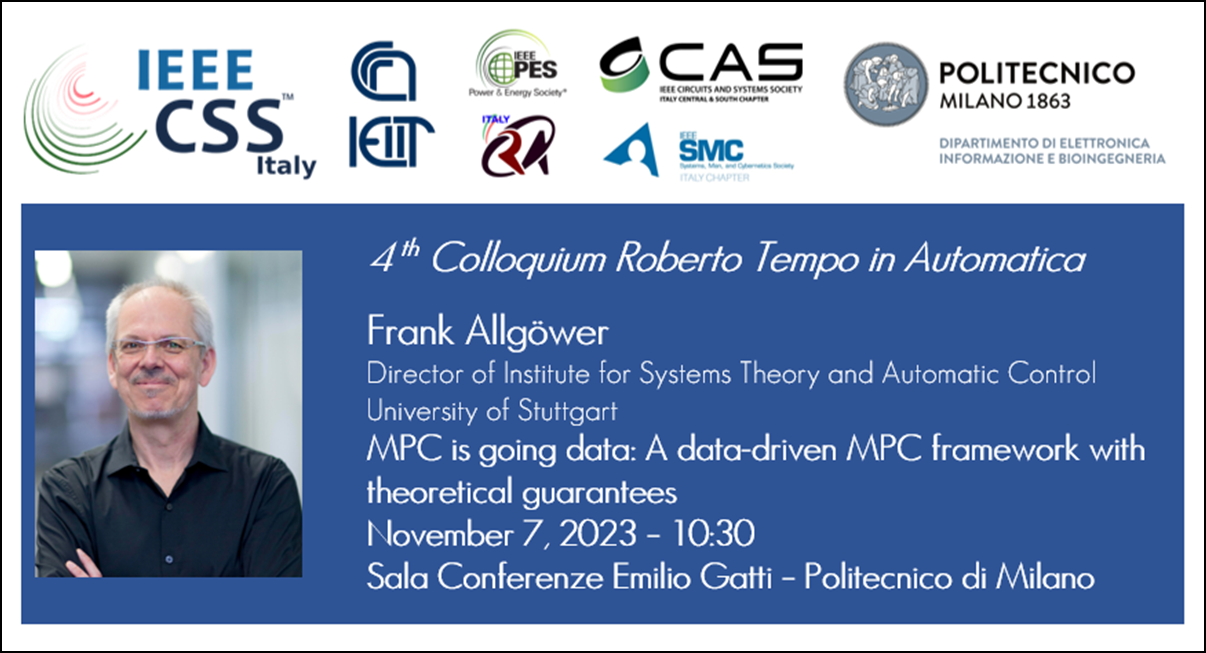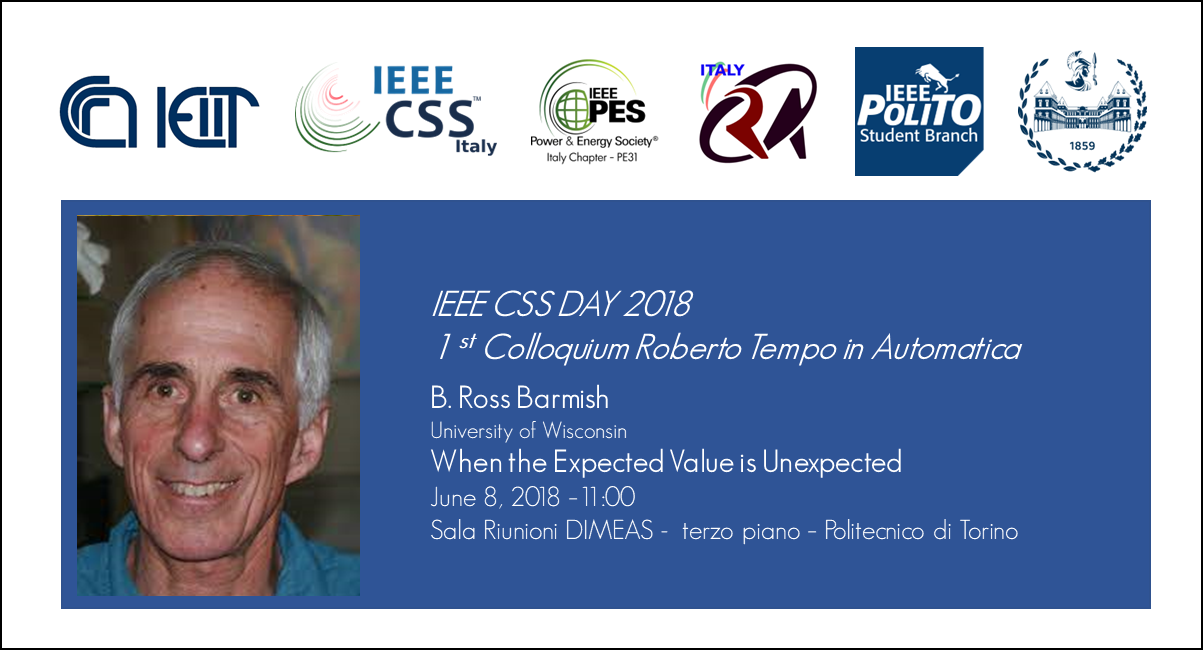
The Colloquia Roberto Tempo in Automatica are dedicated to the memory of our friend and colleague Roberto, who passed away suddenly in 2017 during a ski mountaineering trip in the Alps. Roberto always believed in importance of sharing and disseminating results in his community.
Roberto was an extraordinary communicator. His talks were always clear and highly inspiring. As an author of scientific contributions, he spent an incredible amount of time making sure that his papers were accurate and easily accessible.
The colloquia are general seminars held by renowned scientists. They range over all aspects of systems and control, and on interdisciplinary subjects where control plays a fundamental role. They aim to contribute at the cultural atmosphere of our Institute, so offering young people the opportunity to be exposed to the teaching of internationally known scholars working in different research areas.
The colloquia are organized by the Information & Systems Engineering (ISE) group of CNR-IEIIT. To allow a broader audience, the seminar will be also streamed online.
The Colloquia have been co-sponsored by Politenico di Torino, Politecnico di Milano – DEIB, and by the Italian Chapters of the IEEE Control Systems Society, the IEEE Robotics & Automation Society, the IEEE Power & Energy Society, the IEEE Circuits and Systems Society, the IEEE Systems, Man, and Cybernetics Society, and the IEEE PoliTo Student Branch.
4th Colloquium Roberto Tempo in Automatica

Bio: Frank Allgöwer is director of the Institute for Systems Theory and Automatic Control at the University of Stuttgart in Germany. His current research interests are to develop new methods for data-based control, optimization-based control, and networked control. Frank has served the scientific community through various roles including Vice-President of the German Research Foundation (2012-2020), President of the International Federation of Automatic Control (2017-2020), Editor for the journal Automatica (2001-2015) and Series Editor for the Springer Lecture Notes in Control and Information Science (since 2008). He has published over 700 scientific articles and received several awards for his research including the 2022 George S. Axelby Award for the data-based MPC scheme presented in this talk.
Click here for the recorded seminar.
Abstract.
While recent years have shown rapid progress of learning-based and data-driven methods to effectively utilize data for control tasks, providing rigorous theoretical guarantees for such methods is challenging and an active field of research. This talk will give an overview of the state of the art of the recently developed framework for data-driven model predictive control (MPC) of unknown systems. In this framework no mathematical model is required for the MPC controller and only input-output data is needed. As a big advantageous feature, this framework admits rigorous theoretical guarantees for the closed loop. The proposed approach relies on the Fundamental Lemma of Willems et al. which parametrizes trajectories of unknown linear systems using data. First, we cover MPC schemes for linear systems with a focus on theoretical guarantees for the closed loop, which can be derived even if the data are noisy. Building on these results, we then move towards the general, nonlinear case. Specifically, we present a data-driven MPC approach which updates the data used for prediction online at every time step and, thereby, stabilizes unknown nonlinear systems using only input-output data. In addition to introducing the framework and the theoretical results, we also discuss successful applications of the proposed framework in simulation and real-world experiments.
3rd Colloquium Roberto Tempo in Automatica

Bio: Tamer Basar has been with University of Illinois Urbana-Champaign since 1981, where he is currently Swanlund Endowed Chair Emeritus; CAS Professor Emeritus of ECE; and Research Professor, CSL and ITI. He has served as Director of the Center for Advanced Study (2014-2020), Interim Dean of Engineering (2018), and Interim Director of the Beckman Institute (2008-2010). He is a member of the US National Academy of Engineering; Fellow of IEEE, IFAC, and SIAM; and has served as presidents of the IEEE Control Systems Society (CSS), the International Society of Dynamic Games (ISDG), and the American Automatic Control Council (AACC). He has received several awards and recognitions over the years, including the highest awards of IEEE CSS, IFAC, AACC, and ISDG, the IEEE Control Systems Technical Field Award, Wilbur Cross Medal from his alma mater Yale, and a number of international honorary doctorates and professorships. He was Editor-in-Chief of the IFAC Journal Automatica between 2004 and 2014, and is currently editor of several book series. He has contributed profusely to fields of systems, control, communications, optimization, networks, and dynamic games, and has current research interests in stochastic teams, games, and networks; multi-agent systems and learning; data-driven distributed optimization; epidemics modeling and control over networks; strategic information transmission, spread of disinformation, and deception; security and trust; energy systems; and cyber-physical systems.
Abstract.
Perhaps the most challenging aspect of research on multi-agent dynamical systems, formulated as non-cooperative stochastic differential/dynamic games (SDGs) with asymmetric dynamic information structures, is the presence of strategic interactions among agents, with each one developing beliefs on others in the absence of shared information. This belief generation process involves what is known as second-guessing phenomenon, which generally entails infinite recursions, thus compounding the difficulty of obtaining (and arriving at) an equilibrium. This difficulty is somewhat alleviated when there is a high population of agents (players), in which case strategic interactions at the level of each agent become much less pronounced. With some structural specifications, this leads to what is known as mean field games (MFGs), which have been the subject of intense research activity during the last fifteen years or so. The talk will first provide a general overview of fundamentals of MFGs approach to decision making in multi-agent dynamical systems in both model-based and model-free settings, and discuss connections to finite-population games. Following this general introduction, the talk will focus, for concrete results, on the structured setting of discrete-time infinite-horizon linear-quadratic-Gaussian dynamic games, where the players are partitioned into finitely-many populations with an underlying graph topology—a framework motivated by paradigms where consensus and dissensus co-exist. In this formulation, each population has a high number of indistinguishable agents, but there is no indistinguishability across different populations. It is possible to characterize the Nash equilibrium (NE) of the underlying game when the number of agents in each population goes to infinity, the so-called mean-field equilibrium (MFE), with only local state information for each agent, which can then be shown to lead to an approximate NE when the population sizes are finite, with a precise quantification of the approximation as a function of population sizes. For the model-free versions of such games, a reinforcement learning algorithm will be introduced based on zero-order stochastic optimization, for computation of the MFE, along with guaranteed convergence. The talk will also address derivation of a finite-sample bound, quantifying the estimation error as a function of the number of samples, and will conclude with a discussion of some extensions of the general setting and future research directions.
2nd Colloquium Roberto Tempo in Automatica

Bio: Francesco Bullo (Fellow, IEEE) received the Laurea degree in electrical engineering from the University of Padova, Padova, Italy, in 1994, and the Ph.D. degree in control and dynamical systems from the California Institute of Technology, Pasadena, CA, USA, in 1999.,He was with the University of Illinois Urbana-Champaign, Champaign, IL, USA. He is currently a Professor with Mechanical Engineering Department and the Center for Control, Dynamical Systems and Computation, University of California, Santa Barbara, Santa Barbara, CA, USA. He has coauthored “Geometric Control of Mechanical Systems” (Springer, 2004), “Distributed Control of Robotic Networks” (Princeton, 2009), and “Lectures on Network Systems” (Kindle Direct Publishing, 2022, v1.6). His research interests include network systems and distributed control with application to robotic coordination, power grids, and social networks. Dr. Bullo was the recipient of the best paper awards for his work in IEEE Control Systems, Automatica, SIAM Journal on Control and Optimization, IEEE Transactions on Circuits and Systems, and IEEE Transactions on Control of Network Systems. He was on the editorial boards of IEEE, SIAM, and ESAIM journals and was the IEEE CSS President. He is a Fellow of IFAC, SIAM, and ASME.
Abstract.
Network systems are mathematical models for the study of cooperation, propagation, synchronization and other dynamical phenomena that arise among interconnected agents. Network systems are widespread in science as they are fundamental modeling tools, e.g., in sociology and epidemiology. They also play a key growing role in technology, e.g., in the design of power grids, cooperative robotic behaviors and distributed computing algorithms. Their study pervades applied mathematics. This talk will review established and emerging frameworks for modeling, analysis and design of network systems. I will survey the available comprehensive theory for linear network systems and then highlight selected nonlinear concepts. Next, I will focus on recent developments by my group on a rigorous and comprehensive framework for the analysis of security, transmission capacity, and multistability for active power flow in power networks.
1st Colloquium Roberto Tempo in Automatica

Bio: Ross Barmish is Professor of Electrical and Computer Engineering at the University of Wisconsin, Madison. Prior to joining UW in 1984, he held faculty positions at Yale University and the University of Rochester. From 2001-2003, he served as Chair of the EECS Department at Case Western Reserve while holding the Nord endowed professorship. He received his Bachelor’s degree in EE from McGill University and the M.S. and Ph.D. degrees, also in EE, from Cornell University. Throughout his career, he has served the IEEE Control Systems Society in many capacities and has been a consultant for a number of companies. Professor Barmish is the author of the textbook “New Tools for Robustness of Linear Systems” and is a Fellow of both the IEEE and IFAC for his contributions to robust control. He received two Best Journal Publication awards, each covering a three-year period, from the International Federation of Automatic Control and has given a number of keynotes and plenary lectures at major conferences. In 2013, he received the IEEE Control Systems Society Bode Prize. While his earlier work concentrated on robustness of dynamical systems, his current university research involves building a bridge between feedback control theory and trading in complex financial markets. In addition to this academic pursuit, in his capacity as CEO of Robust Trading Solutions, his work involves transition of stock-trading algorithms from theory to practice and government sponsored research on the NASDAQ Limit Order Book.
Abstract. Our motivation for the research to be described is derived from the following fact: The expected value of a random variable X, denoted E(X), is often inconsistent with what human beings may actually expect based on psychological considerations. This is particularly important when predictions involving life-threatening situations arise. To bring this issue into sharp focus, this seminar begins with a set of questions related to the recent rampage of Hurricane Irma from the Gulf of Mexico into in the State of Florida. When the use of empirical data leads to an expected value forecast of storm surge wave height which is unduly pessimistic, will the “boy who cried wolf” effect be in play the next time a hurricane approaches the mainland? On the other hand, if the formally calculated expected wave height is too optimistic, might it be the case that many will take inadequate protective measures? Based on such considerations, we define a new alternative to E(X) which we believe is quite useful for “mission critical” situations with downside risk being of paramount concern. We call this new metric the Conservative Expected Value and denote it by CEV(X). In this talk, we provide the technical definition of the CEV, compare it with the classical expected value and describe some aspects of the rich mathematical theory which accompanies it. We also include a description of some of the studies we have conducted using the CEV to evaluate historical data. This talk is dedicated to the memory of Roberto Tempo.


